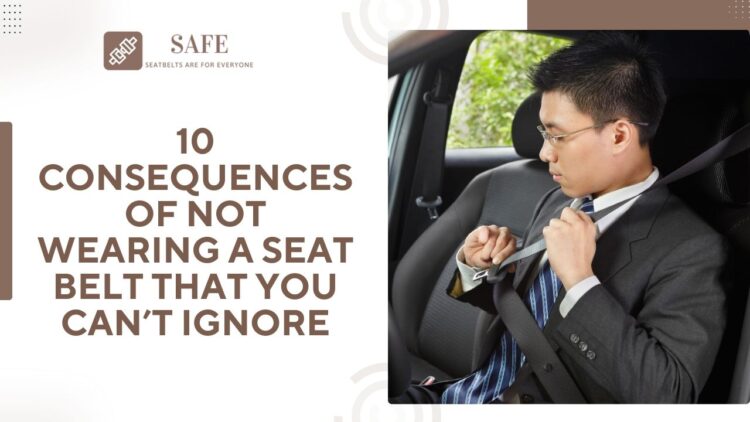Not wearing a seat belt may seem like a small choice, but the consequences can be life-changing. Seat belts are designed to save lives, reduce the severity of injuries, and protect everyone in the vehicle. Ignoring this basic safety measure not only increases personal risk but also creates dangers for passengers and financial burdens for families. Below are the 10 biggest consequences of not buckling up.
1. Higher Risk of Death
Studies show that wearing a seat belt reduces the risk of fatal injury by nearly 45% in cars and even more in trucks. Without one, your survival odds plummet during a serious crash.
2. Severe Injuries in Accidents
Seat belts help keep you in place, preventing violent contact with the steering wheel, dashboard, or windshield. Those who don’t wear them face 50–65% higher risk of critical injuries in a crash.
3. Ejection from the Vehicle
One of the most dangerous outcomes of not wearing a seat belt is being thrown out of the vehicle during a collision. Ejections are almost always fatal or cause permanent disability.
4. Airbag-Related Injuries
Airbags are designed to work with seat belts, not as replacements. Without a seat belt, the force of an airbag can actually cause severe injury or death.
5. Risk to Other Passengers
Unbelted passengers become dangerous projectiles in a crash. For example, an unrestrained person in the back seat can increase the driver’s death risk by over 100%.
6. Loss of Vehicle Control
Seat belts keep the driver securely positioned, which is crucial for maintaining control of the vehicle during sudden movements. Without it, drivers can slide out of position and cause secondary crashes.
7. Legal Penalties and Fines
Most regions have strict seat belt laws. Penalties can range from $25 to over $200, depending on location, and may include points on your license.
8. Higher Insurance Premiums
A seat belt violation is often treated as a moving violation by insurers. This can result in increased insurance costs and loss of “safe driver” discounts.
9. Burden on Healthcare and Society
Crashes involving unbelted passengers contribute billions in medical costs and lost productivity each year, adding strain on healthcare systems and taxpayers.
10. Increased Nighttime Fatalities
Night driving is already more dangerous, and statistics show that over half of nighttime crash fatalities involve unbelted occupants. This highlights the importance of always buckling up.
Key Consequences of Not Wearing a Seat Belt
| Consequence | Impact |
|---|---|
| Higher Risk of Death | Fatal injury risk rises by nearly 45% |
| Severe Injuries | 50–65% more likely to suffer critical injuries |
| Ejection from Vehicle | Often fatal or permanently disabling |
| Airbag-Related Injuries | Airbags can cause harm without a belt |
| Risk to Passengers | Unbelted rear passenger doubles driver’s death risk |
| Loss of Control | Drivers slide out of position, lose control |
| Legal Penalties | Fines from $25–$200+ depending on state |
| Insurance Costs | Premiums increase, discounts lost |
| Societal Costs | Billions in healthcare and productivity losses |
| Nighttime Danger | Over 50% of fatalities at night are unbelted |
Wearing a seat belt is the simplest and most effective way to save your life and protect others. From avoiding severe injuries to preventing fines and insurance hikes, the benefits of buckling up far outweigh any inconvenience. Remember: Every seat, every trip, buckle up.
FAQs
Do airbags replace the need for seat belts?
No. Airbags are designed to work with seat belts. Without a belt, airbags can cause more harm than good.
Is wearing a seat belt necessary in the back seat?
Yes. Rear passengers who don’t buckle up can endanger themselves and the people in the front seats.
Can a seat belt ticket increase my insurance rates?
Yes. Many insurers treat it as a moving violation, which can raise your premiums and cost you discounts.

